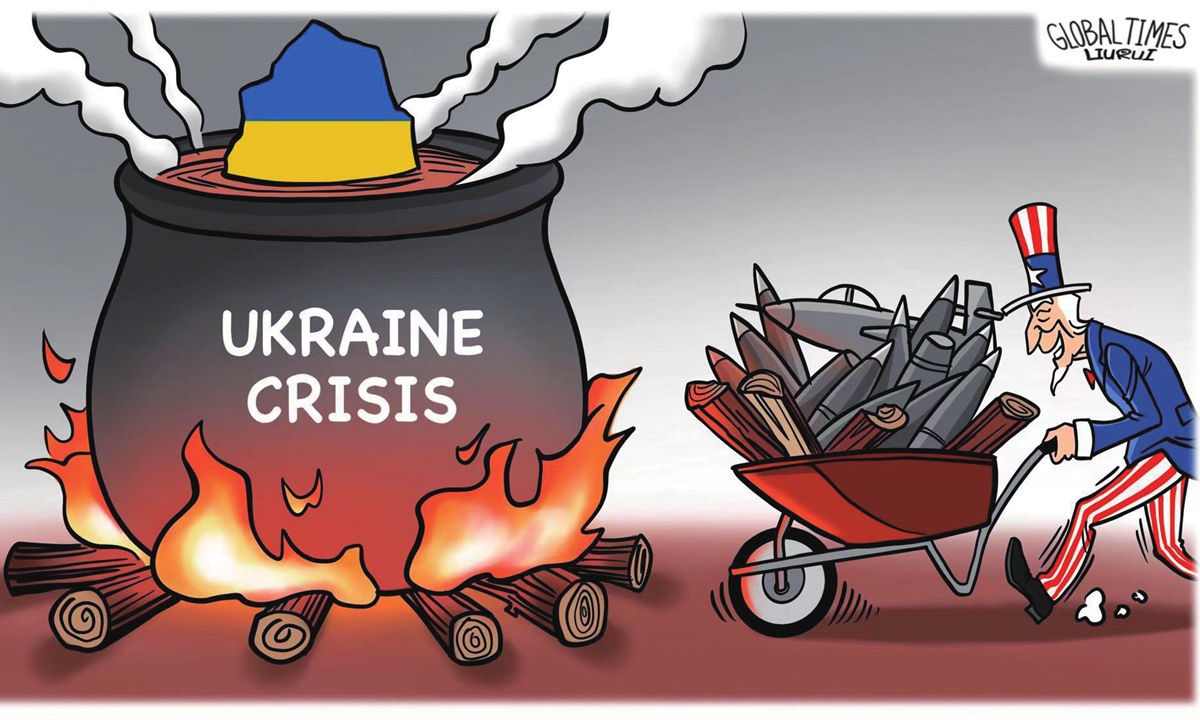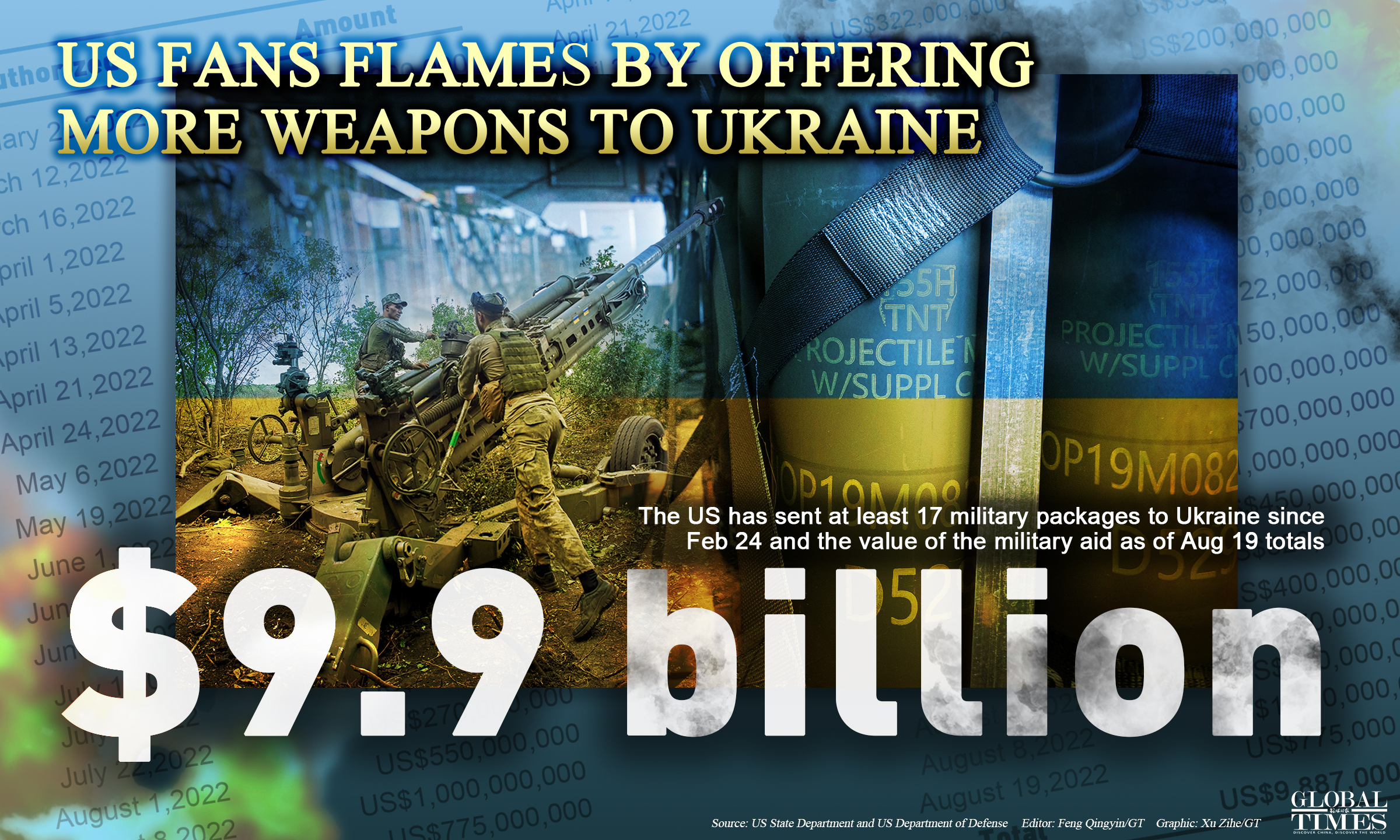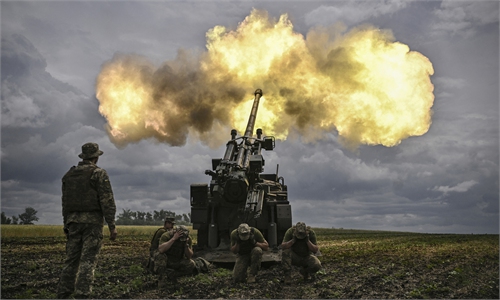Six months on, US adds fuel to Ukraine crisis with $3b aid as world order alters, West hegemony weakens

Illustration:Liu Rui/GT
It's been six months since the Russia-Ukraine military conflict exploded in February, and the crisis has turned into grinding battles with no clear endgame in sight. While the US and NATO continue to fan flames as the Biden administration announced nearly $3 billion in military aid to Kiev on Wednesday, also the Independence Day of Ukraine, Russia claimed that it has deliberately slowed down its military advance in the special military operation in Ukraine "in order to reduce civilian casualties."
Russian Defense Minister Sergey Shoigu made the remarks on Wednesday and said the Russian troops are paying efforts to restore peace in the Russian-controlled areas, TASS reported, while according to the White House statement about the new military aids, Ukraine will receive "air defense systems, artillery systems and munitions, counter-unmanned aerial systems, and radars to ensure it can continue to defend itself over the long term."
After the six-month conflict between Russia and Ukraine, it is no doubt the crisis has profoundly changed the world order in many aspects including world peace, global supply chains, international relations and also food and energy security for many countries around the globe.
Who should be blamed? What will happen next? Chinese analysts believe the conflict was not sparked by an "unprovoked invasion" by Russia as the US claimed, but was fundamentally caused by NATO's expansionism and the US strategy to contain Russia with increasing military deployments in Europe and instigate color revolutions in Russia's neighbors.
But the crisis gives rise to both danger and transformation, as the world order is getting more and more multi-polarized rather than uni-polarized, and the US hegemony that has caused chaos and instabilities worldwide in the past decades is weakening.
The military operation launched by Russia has always been accused by the US and many Western countries as an "unprovoked invasion," but in the past six months very few non-Western countries have shown interest to join the Western-launched condemnation and sanctions against Russia. The West is also becoming more divided, not only in executing anti-Russia sanctions but also in supporting Ukraine with weapons and money, experts said, noting that since both Russia and Ukraine are stronger than expected, the conflict will also take a longer time than initially expected. The world needs to be prepared, the experts said.
The assassination of Darya Dugina, a Russian commentator and scholar, for which Russia accused a Ukrainian suspect, showed that the conflict between the two countries has produced irreversible hatred and tragedies, and the ceasefire and the restore of peace will not be that easy, experts noted.

US fans flames by offering more weapons to Ukraine Editor: Feng Qingyin/GT Graphic: Xu Zihe/GT
Who should be blamed?
"US' attempt to secure its hegemony via manipulating the eastward expansion of NATO, leaving Russia no choice but to create a buffer zone for the sake of its national security, was the main cause of conflict." However, while the military industrial complex of the US has benefited in the process, Europe has been dragged down with major economic and social problems, Song Zhongping, a military expert and TV commentator, told the Global Times on Wednesday.
The prolonged conflict will eventually backfire on the US, as its dollar-based sanctions have in fact pushed forward a reverse-dollarization. Many countries in Africa, Asia and Latin America have realized what the US is after in the conflict and shown reluctance to follow blindly, which has also further cemented a multi-polarization and true multilateralism, and made the US hegemony come close to going bankrupt, Song said.
NATO Secretary-General Jens Stoltenberg said in an interview with the media on Tuesday that it was necessary to continue providing assistance to Ukraine, however he admitted that it would be tough and that Europe would pay a price for its support to Kiev, TASS reported.
CNN also published an article on Monday saying that "A grim winter will test Europe's support for Ukraine like never before." Officials across Europe are worried that the consensus could fall apart as the continent enters a bleak winter of rising food prices, limited energy to heat homes and the real possibility of a recession. "Western officials and diplomats spoke to CNN on the condition of anonymity to candidly describe sensitive conservations among governments," according to the report.
Some analysts believe in the past six months, Russia, Ukraine and the EU are all losing in different aspects, but the US, especially US arm dealers and military industrial giants, are the absolute winners as they have successfully ruined the peace and stability in Europe, and undermine the euro zone again by pushing NATO expansion and hyping anti-Russia sentiment in Ukraine, so that Washington could even let its European allies, who are actually victims of US zero-sum strategy, to sanction Russia with huge costs and spend huge amount of money to buy US weapons.
Weakening US hegemony
But is the US really winning only because of these short-term benefits? Chinese analysts said in this profound change of the world order, the US hegemony has already been shaken, and the world has discovered the weakness of such a hegemonic system and the risk of standing too close with the US during this crisis.
"The conflict has shaken the US-led international order; Russia's special military operation in Ukraine could be viewed as the aftershock from the 2014 Ukraine crisis, the cause of which is the US-led NATO's eastward expansion and US' using of color revolution to jeopardize regional order and balance of power," Cui Heng, an assistant research fellow from the Center for Russian Studies of East China Normal University, told the Global Times on Wednesday.
The recent decade has witnessed constantly renewed new lows of the US and its allies, and they have repeatedly trampled on their so-called orders. It seems on the surface that the US and the EU have continually achieved new breakthroughs, but in fact, their reckless actions have undermined the authority and constraining force of the rules that they had established, making other powers no longer willing to follow such orders, Cui said, citing the Russia-Ukraine conflict as the latest evidence that the US-led world order has collapsed.
The conflict has inflicted huge pressure to the world economy. Europe has been the most affected victim with shortage crises emerging in both food and energy sectors. Even if Europe is trying hard to reduce dependence on Russian energy, it cannot be done in a short time, Cui pointed out.
European natural gas prices surged on Monday after Russia's state-owned energy giant Gazprom said it would shut down Europe's single biggest piece of gas infrastructure for three days from the end of the month, CNBC reported.
Global governance has also been affected by the conflict, as sense of insecurity has been surging after the breakout of the crisis. Conservative ideas emphasizing security and geopolitics are gaining ground, replacing the idea of mutual cooperation and creating common interests on which global governance depends. When the country focuses on how to mobilize resources to develop military power and solve security dilemmas, how can it be possible to solve problems such as climate change, pollution control, and global poverty reduction that require joint efforts of countries around the world, according to Cui.
Majority of Asian, African and Latin American countries choose to keep distance from the US and its allies, holding a neutral ground in the conflict as they understand the boots Russia is in and even though they are not expressing support for Russia's counter strike, they cannot agree on the US-led Western smears against Russia, Cui said.
"For instance, Saudi Arabia is a close US ally in the Middle East, and it's benefited from the hegemony of US dollars, but now it has found that such system is highly risky, and it's also seeking more alternative to reduce dependency over the US-dominated payment system, and many other countries like Indonesia, Argentina, Turkey are also sharing the similar concerns, and this is why they are interested in the non-Western mechanism like the BRICS Plus and to develop closer relations with China," said a Beijing-based expert in international relations who asked for anonymity.
After the world witnessed the ruthless Western sanctions against not only the Russia government but also Russian individuals and even animals and cultures, the West is destroying the "rules," and the so-called "rule-based order" already collapsed long ago since the US bypassed the UN Security Council to invade Iraq, and bombed countries like Libya and Syria to spread chaos in the name of "democracy and human rights," said the expert, noting the West has to face the consequence that other major powers like Russia will refuse to follow the "rules" as well.



